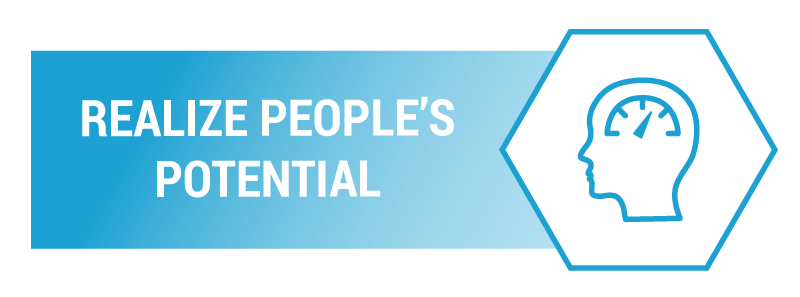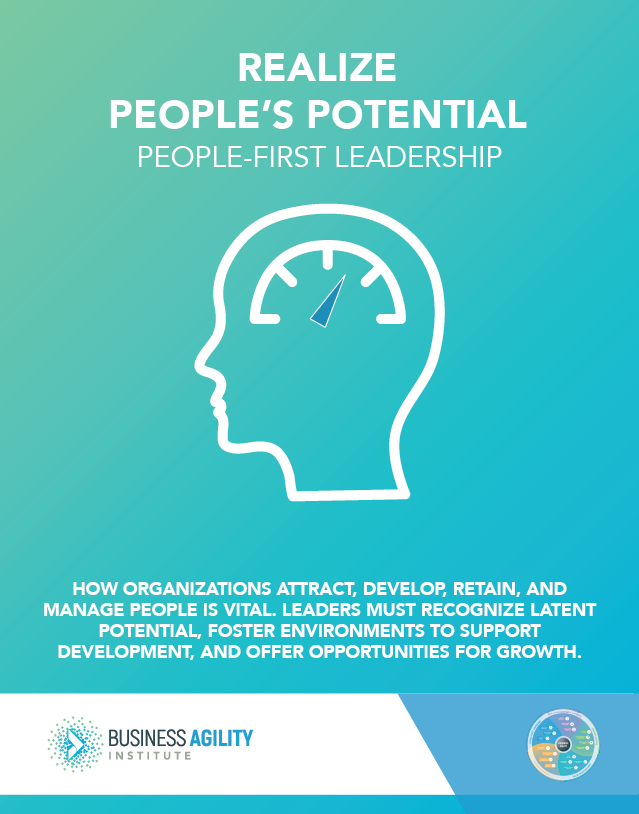Domains of Business Agility
- Responsive Customer-Centricity
- / Fiercely Champion The Customer
- / Sense & Respond Proactively
- / Integrate Diverse Ideas
- Engaged Culture
- / Cultivate A “Learning Organization”
- / Engage Transparently & Courageously
- / Embed Psychological Safety
- / Act As One
- Value-Based Delivery
- / Unleash Workflow Creatively
- / Prioritize. Prioritize. Prioritize.
- / Deliver Value Sooner
- / Seize Emergent Opportunities
- Flexible Operations
- / Adapt Strategies Seamlessly
- / Fund Work Dynamically
- / (Re)Organize Structures Fluidly
- / Balance Governance And Risk
- People-First Leadership
- / Foster Authentic Relationships
- / Empower With Accountability
- / Realize People’s Potential
People are the lifeblood of an organization. It’s their talents, skills, and ideas that enable success. Therefore, how organizations attract, develop, retain, and manage people is vital. Realizing potential in people is a partnership: leaders must recognize latent potential, foster environments to support development, and offer opportunities for growth; ultimately, however, the responsibility for pursuing and realizing potential belongs to people themselves.
Leaders need to be clear about what is needed for each role in the organization, ensuring that everyone has what they need to succeed and develop. This means taking a systems perspective. What complementary behaviors, skills, and experiences would support the work right now? Would someone benefit from a lateral move within the organization, rather than continued development where they are? What skills and experiences will be needed down the road? Without an ongoing commitment to realizing people’s potential, work becomes transactional — and genuinely customer-centered innovation becomes impossible.
Primary Behaviors
The following 7 behaviors strongly contribute to the ability to realize people’s potential.
B78: Leaders are accessible, supportive, and give regular actionable feedback: Feedback is a foundational skill for both systems and for people. Leaders are proactive in providing timely feedback for both positive and negative feedback. They act from a place of improvement, providing constructive feedback that helps the receiver improve.
B79: Everyone makes time to learn and develop: In recognition that there will always be tension between “what’s needed today” versus “what will be needed in the future”, the importance of professional development is understood and supported in the organization. Managers take the time to discuss professional development interests and needs with their employees, and include professional development in the budget and schedule. Employees take responsibility for taking action in support of their professional development.
B80: Leaders reinforce positive behavior: Leaders recognize, encourage, and immediately celebrate “what’s going right” to create a positive feedback loop.
B81: Leaders develop people to take increasing ownership and accountability: Leaders work with their people to develop the skills, judgment, and autonomy needed to take increasing responsibility for their work.
B82: Leaders deliberately craft the employee (and candidate) experience: Leaders intentionally design and improve each step of an employee experience; from recruitment, onboarding, development, retention, and finally exit. This experience is designed to serve both the needs of the employee as well as the organization.
B83: Executives design incentive and reward systems that tap into intrinsic motivation: We create sophisticated incentive and reward systems that are designed to connect an individual's intrinsic motivation with business goals – rather than traditional motivators (such as bonuses).
B84: Leaders instill a strong culture of DE&I: Leaders consistently demonstrate their commitment to diversity, equity, and inclusion through the daily questions they ask, the decisions they make, and the actions they take.


